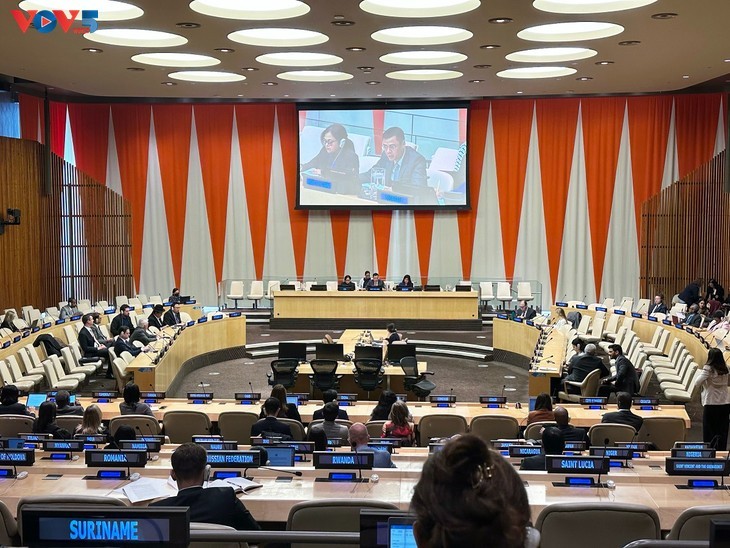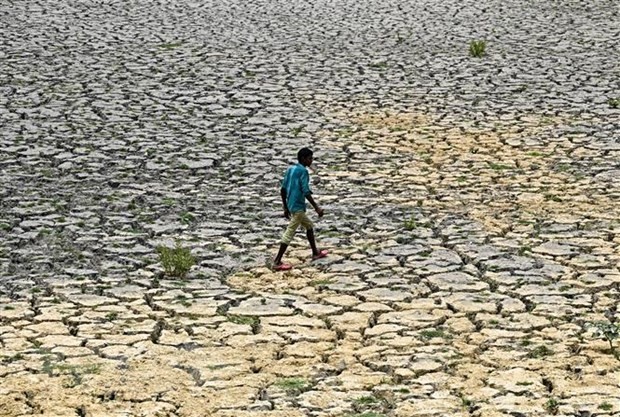 |
| Ambassador Dang Hoang Giang attends a meeting to celebrate the International Mother Earth Day. Photo: VOV reporter in the US |
Ambassador Dang Hoang Giang, Vietnam’s Permanent Representative to the United Nations (UN), attended a meeting in New York on April 24 to celebrate International Mother Earth Day, acting as the Vice President of the 77th session of the UN General Assembly (UNGA 77). According to the Vietnam News Agency (VNA), the event was organized to recognize and pay tribute to the Earth and its inhabitants, and to raise awareness about environmental protection. Giang said that this year’s theme “Restore Our Earth” was particularly relevant in light of the current crisis, and that urgent action was needed to protect the planet’s biodiversity. He also highlighted Vietnam’s efforts to protect and restore the environment, saying that the country had achieved remarkable success in recent years. Ambassador Dang Hoang Giang, Vietnam’s Permanent Representative to the United Nations (UN), attended a meeting in New York on April 24 to celebrate International Mother Earth Day, as Vice President of the 77th session of the UN General Assembly (UNGA 77), VNA reported.
Addressing the event, the President of the UNGA 77 Csaba Kőrösi expressed concern about the impact of unsustainable economic development, production, and consumption on the earth.
He also emphasized the need to reduce impacts on the environment, respect biological limits, recognize the interdependence between humans and ecosystems, and look for innovative solutions to tackle environmental issues.
Representatives from different nations have reiterated their commitment to protecting the Earth, responding to climate change, safeguarding global biological systems and biodiversity, and fostering harmony with the environment and the planet, in order to realize the Sustainable Development Goals (SDGs) and move towards a more sustainable world. By doing so, they hope to ensure a better and more secure future for all.
It is imperative that these objectives are accomplished through a wide array of strategies, including intensifying global collaboration and multilateralism, procuring resources and scientific knowledge, transferring technology, developing capacity, and encouraging joint worldwide efforts to tackle existing issues.
Designated more than 10 years ago, International Mother Earth Day (April 22) is a time for countries around the world to come together and proclaim the Earth as our “common home”. On this day, we are reminded to promote harmony between humans and nature, while also taking action to protect our environment and ensure a sustainable and prosperous planet.
 |
| In 2009, the UNGA decided to designate April 22 as International Mother Earth Day with the aim of increasing public awareness and global efforts in protecting the earth and biodiversity and ensuring harmonization between humans, other creatures, and the earth. Photo: AFP/VNA |
In Vietnam, a nation that is exceptionally susceptible to climate change, there has been an increase in the frequency of extreme weather conditions in recent years. This is particularly concerning, given the potentially catastrophic impact that climate change can have on the country’s vulnerable population and environment.
The devastating effects of climate change are creating major challenges to climate security, posing potential threats to national stability and development, and leading to surges of migration.
The Government of Vietnam ratified the Paris Climate Accords in 2016 and issued a comprehensive plan to implement the agreement. At the 26th UN Climate Change Conference (COP26), the Vietnamese Prime Minister declared his country’s commitment to achieving net-zero emissions by 2050. This pledge was met with widespread support from the international community, showing the commitment of the Vietnamese government to tackling climate change.
As part of its efforts to fulfill its commitment, Vietnam has significantly increased its contribution to reducing greenhouse gas emissions in its updated Nationally Determined Contribution (NDC) for 2022. Specifically, the country has raised its unconditional emission reduction rate to 15.8% in 2022, up from 9% in its 2020 NCD.
The conditional emission reduction rate was also increased to 43.5% in 2022 from 27% in the 2020 NDC, he noted, crediting the successes to the support from the project and its partners.
After four years of implementation, the project has made significant contributions, particularly in terms of consultations, to the development of the policy framework for responding to climate change and the updating of the NDC. Additionally, it has assisted in strengthening the capacity of national contact points, ministries, and localities in managing and coordinating the implementation of the NDC and the Paris Agreement.
The project has been instrumental in establishing four metering, reporting, and verifying systems for reducing greenhouse gas (GHG) emissions, aiding ministries and departments in the creation of policies and plans related to the field, according to Tang The Cuong, director of the Department of Climate Change at the Ministry of Natural Resources and Environment, who spoke at a conference held in Hanoi on March 31.








